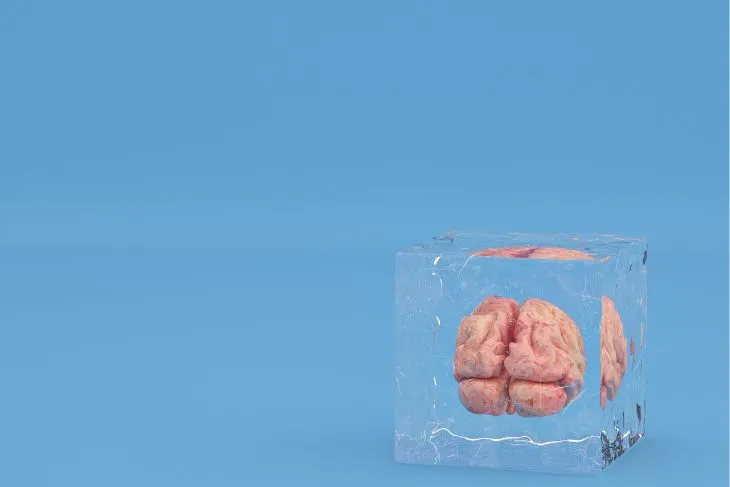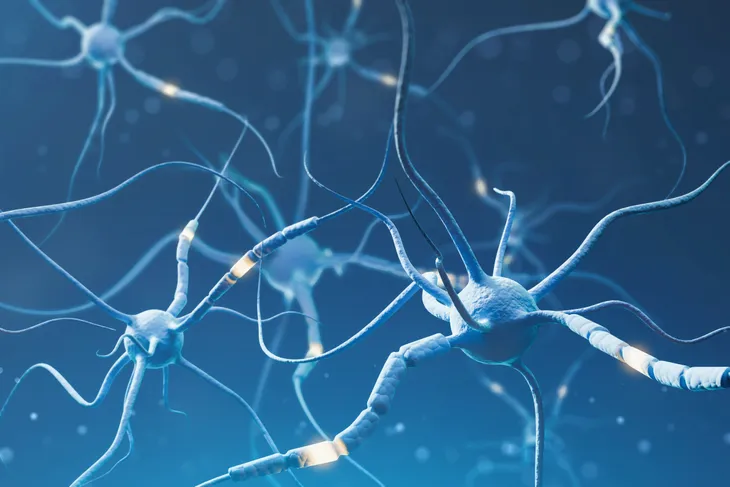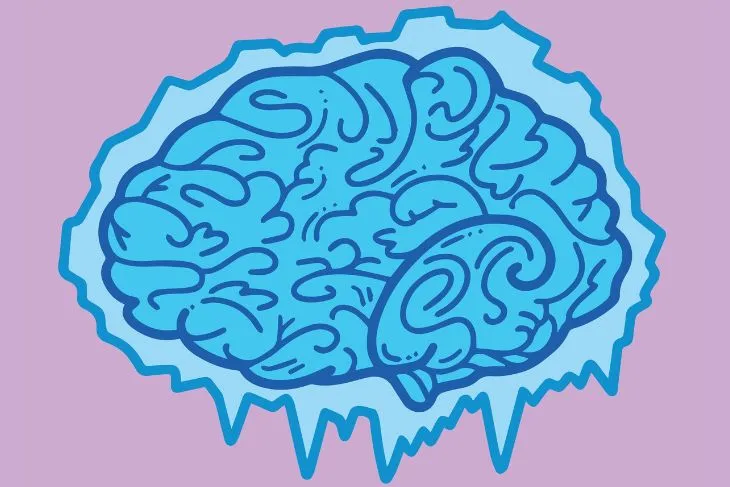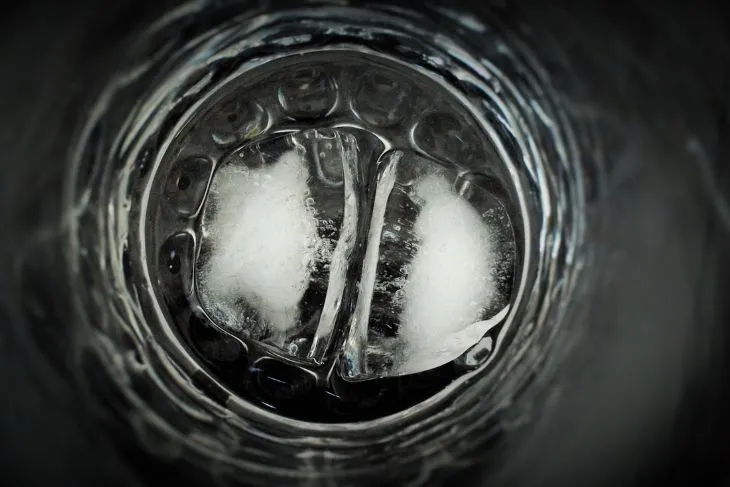- Brain freeze (ice cream headache) occurs when someone consumes something cold (or enters cold temperatures) very quickly.
- It results in a short-term headache that lasts anywhere from a couple seconds to a few minutes.
- While it’s not serious, it will cause a sudden and sharp pain in the front of the head (forehead region).
- The only treatment is to stop (or slow down) consuming the cold food or drink and wait for it to pass.
Most of us have experienced brain freeze before. It’s that head pounding sensation that comes after eating or drinking something really cold like ice cream or a slushy. While it’s not painful, it’s certainly an unpleasant feeling.
It often stops people in their tracks, as they wince and grab their forehead in hopes that will stop. Ever wondered why brain freeze happens in the first place? We look into answering this question by looking into the science behind brain freeze, the common symptoms, causes, treatment options, and some prevention tips…
What is Brain Freeze?
The scientific term for ‘brain freeze’ is sphenopalatine ganglioneuralgia, but Cleveland Clinic notes it’s more commonly referred to as an ice cream headache, cold-induced headache or a cold stimulus headache. It occurs when something extremely cold touches the upper palate (roof of the mouth), like when someone consumes something cold too fast, explains Medical News Today.
Brain freeze occurs as a brief, but intense pain that is felt in the front of the head (forehead region) or a short-term headache.
Sphenopalatine Ganglioneuralgia Nerves
The reason brain freeze is called sphenopalatine ganglioneuralgia is because it’s caused by the sphenopalatine ganglion nerves, says Healthline. This is a group of nerves near the trigeminal nerve in the brain.
We feel brain freeze in the front area of our head because the sphenopalatine ganglion nerves are located behind the nose. According to Healthline, they are the same nerves responsible for causing headache pain. “They’re designed to be highly sensitive to pain, presumably to protect the brain,” writes the source.
Symptoms of Brain Freeze
While brain freeze isn’t serious, it will result in a very sudden and intense pain in the frontal part of the head. It’s typically most felt in the forehead, around the eyes and nose. Healthline notes people can have either a dull ache or something more serious like a sharp pain.
The discomfort of brain freeze can be intense, but it doesn’t last long. It ranges anywhere from a couple seconds to a full minute or two. It all depends on the cause, such as the amount of cold liquid or food and how fast it was consumed, says Healthline, or how cold the weather is they are experiencing.
Causes of Brain Freeze
Brain freeze is obviously caused by cold temperatures, but according to Medical News Today, the science behind it has to do with vasoconstriction (narrowing of the blood vessels). This occurs as a result of “cooling the sinus capillaries by a cold stimulus,” writes the source.
When our body senses something cold, it reacts by trying to warm itself up. “Blood vessels throughout the head expand to let extra blood into the area for warmth,” explains the Cleveland Clinic. The widening of blood vessels is called vasodilation and it’s this quick change in blood vessel size that creates the sensation we recognize as brain freeze. “The proximity of very sensitive nerves and the extreme stimuli changes are what cause the nerves to react,” adds Medical News Today.
Common culprits of brain freeze are freezing air, frozen or slushy drinks, ice cream, ice cubes, and popsicles.
Dr. Jorge Serrador’s Research
For the longest time scientists have only been able to speculate an explanation to why brain freeze happens, until now. Dr. Jorge Serrador, M.D. of Harvard Medical School and lead researcher on a study published in The FASEB Journal (April 2012 issue) which found that brain freeze is indeed a result of an increase in blood flow.
For his research he recruited 13 healthy adults and asked them to sip ice-cold water through a straw, directing the liquid to their upper palate. While they did this, he monitored the blood flow to their brain with a transcranial Doppler test. His finding showed that “the sensations of brain freeze appears to be caused by a dramatic and sudden increase in blood flow through the brain’s anterior cerebral artery,” writes Healthline. “As soon as the artery constricted, the brain-freeze pain sensation wore off.”
He was able to counteract this constriction by giving the volunteers warm water to drink.
Brain Freeze and Migraines
While anyone can get brain freeze, Johns Hopkins Medicine states that research shows people who suffer from migraines are more likely to experience it. “The pain of brain freeze headaches is more intense and sharp than that of a migraine,” writes the source. “Both headaches can occur in the forehead and result in throbbing pain.” The source also notes that in 98-percent of patients, brain freeze is extremely brief, lasting less than 5-minutes.
Healthline also points to another study from 2001 examining cold-induced headaches in women. This research also found that participants with a history of migraines were more likely to experience brain freeze. “They only saw an increase in cold-induced headaches among people who had a migraine in the past year,” writes Healthline. In this case, these individuals were twice as likely to experience a cold-induced headache than those without a history of migraines.
It Could be a Defense Mechanism
Dr. Serrador thinks brain freeze may be a defense mechanism. Our brain is obviously an important organ that needs to be working at all times, so the body will work to preserve it, explains Serrador. “It’s fairly sensitive to temperature, so vasodilation might be moving warm blood inside tissue to make sure the brain stays warm.”
Serrador’s research may lead to a form of treatment for some types of headaches. “If dilated arteries cause a sudden rush of blood to the brain, which raises pressure and causes pain, a drug that constricts the blood vessel should reduce pressure and eliminate the pain,” writes Medical News Today. If we can find a way to constrict the blood vessels supplying the brain, it could prevent pressure from building too high.
How is it Different From Other Headaches?
There are certainly many similarities between brain freeze and headaches, and a correlation between people who experience migraines. So, what’s the difference between the two? The biggest difference is the duration. The Cleveland Clinic points out that brain freeze comes and goes very quickly, which is not the case for most headaches.
Brain freeze typically lasts anywhere from a couple second to a few minutes and then goes away on its own without any rest. Another difference is that other types of headaches can cause additional symptoms. For example a migraine can make a person nauseous, in addition to the pain. “Some headaches can make it hard to tolerate bright light or loud noise,” writes the source. Brain freeze will not do any of these things.
How to Make Brain Freeze Go Away
When a person experiences brain freeze, there’s not much they can do in the form of treatment. Luckily, it’s also not a serious issue. But it is unpleasant so there are some tricks to help make it go away faster. The key is to return your mouth and throat back to their normal temperature.
The easiest way to do this is to take a break from eating that sundae or drinking a slushy, or head inside where it’s warmer. The Cleveland Clinic also suggests counteracting the cold by drinking a warm or room-temperature liquid (not too hot or cold) or press the tongue (or thumb) to the roof of your mouth to transfer some warmth. Also, cover your mouth and nose with your hands, then breathe rapidly to increase the flow of warm air to the palate, says Medical News Today.
Preventing Brain Freeze
There isn’t a whole lot a person can do to prevent brain freeze. It’s the body’s natural way or reacting to cold temperatures. The only surefire way to prevent it is to avoid sudden, extreme changes in temperature in the mouth, throat, and head, says the Cleveland Clinic.
The source suggests avoiding freezing food, drinks, and air (when possible). If you must eat or drink something very cold, try to do so slowly. When going outside in extremely cold temperatures, create a barrier from the cold air by using a scarf or face mask.
Brain Freeze and Irregular Heartbeats
Brain freeze involves the same nerves as serious headache disorders, such as cluster headache, warns Healthline. This headache disorder causes severe, consistent pain. The source points to reports which found a possible connection between consuming a cold beverage and atrial fibrillation (AF). This is a type of arrhythmia, also known as an irregular heartbeat.
While this connection is rare, anyone who starts to experience irregular heartbeats after drinking or eating something cold should contact their doctor. You should also visit a doctor if brain freeze lasts longer than 5-minutes or occurs without consuming anything cold or being in a cold environment.
Outlook
You don’t need to call a doctor after experiencing brain freeze. It’s not a serious condition or rare phenomenon. While it’s uncomfortable and will cause some discomfort for a period of time, it should resolve on its own within a matter of minutes.
“In rare cases, you may experience other symptoms, like an irregular heartbeat, after consuming something cold,” writes Healthline. If a person suspects they have AF, go see a doctor. The source also suggests people who have intense headaches that last longer than 5-minutes, suffer from headaches on a regular basis, or experience brain freeze without plausible cause, should talk to their doctor.















